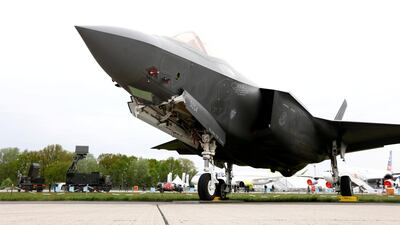Washington halted delivery of F-35 jet equipment to Turkey on Monday in a message that the US will limit their defence relationship if Ankara obtains the Russian S-400 missile system.
All shipments of training equipment for the stealth fighters, needed to prepare for their arrival, have been cancelled, Reuters reported.
A pentagon spokesman said the suspension in deliveries was pending "an unequivocal Turkish decision to forgo delivery of the S-400", CNN reported.
The US Defence Department was not immediately available for comment.
Turkish Foreign Minister Mevlut Cavusoglu’s is due to visit Washington on Wednesday for the Nato ministerial meeting and talks with senior US officials.
Aaron Stein, the director of the Middle East programme at the Foreign Policy Research Institute, said he was not surprised by the move.
Mr Stein told The National that the US government "appears to have sketched out a sequential effort to increase pressure" on Ankara, in hopes that it abandons its S-400 deal with Russia, which is due to be delivered in July.
But he said the timing of the US decision, after local elections in Turkey where President Recep Tayyip Erdogan's party lost in Ankara and Istanbul, was significant.
“This is a conscious US decision not to influence any outcome or to give Mr Erdogan any more anti-American fodder for his campaign,” Mr Stein said.
He said the US strategy was “to increase pressure before the Countering America’s Adversaries Through Sanctions Act and concurrent moves to block the F-35 to try to stave off a serious break in relations".
The Act, passed by Congress and signed by US President Donald Trump in August 2017, punishes anyone dealing with certain Russian intelligence and military entities. The law also covers deals with Iran and North Korea.
Mr Stein said that the US did not want to block F-35 transfers to Turkey or sanction Ankara unless the S-400 delivery occured in July, and then became operational in October.
Turkey has at least 100 F-35 jets on order from the US, with each costing about $90 million (Dh330.5m).
“The S-400 is a computer. The F-35 is a computer," said Katie Wheelbarger, acting assistant secretary of defence.
"You don't hook your computer to your adversary's computer and that's basically what we would be doing.”
But Turkey is not showing any signs of abandoning the deal. Mr Erdogan and Russian President Vladimir Putin spoke on Monday and plans are under way for the delivery of the S-400.
“We have signed a deal with Russia, and this deal is valid. Now we are discussing the delivery process,” Mr Cavusoglu said on Friday as he received Russian Foreign Minister Sergey Lavrov.
A bipartisan group of US senators introduced a bill last week to block the F-35 transfers if the S-400 delivery occurs in July.
US defence officials have also hinted in the past that Ankara would be risking its membership in the Joint Strike Fighter programme, which it joined in 2002, if it went ahead with the S-400 deal.

